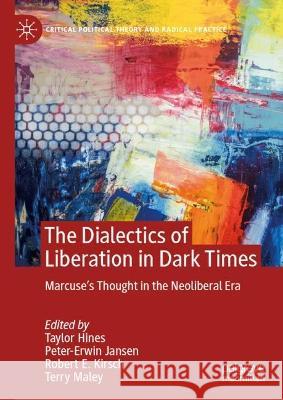The Dialectics of Liberation in Dark Times: Marcuse's Thought in the Neoliberal Era » książka
The Dialectics of Liberation in Dark Times: Marcuse's Thought in the Neoliberal Era
ISBN-13: 9783031224874 / Angielski / Twarda / 2023
This book develops Marcuse’s critique of advanced industrial society and deploys it as a lens to critically analyze contemporary neoliberalism and its structural failures. In the chapters, Marcuse scholars explore three related topics: First, Marcuse’s theory as it applies to the relationship between neoliberalism and authoritarianism, including both the historical relationship between the two and the modern re-emergence of authoritarianism and nationalism in neoliberal states today. Second, a re-examination of the relationship between neoliberal subjectivity and technological rationality that seeks to understand the stabilizing forces of neoliberal society and the way these forces register at the level of thought. Third and finally, Marcuse’s conception of socialism in conversation with contemporary neoliberal rationality, and ways in which alternatives to the status quo remain possible. Together, this volume contributes to recent discussions of neoliberalism and contribute to the development of Marcuse scholarship.
This book develops Marcuse’s critique of advanced industrial society and deploys it as a lens to critically analyze contemporary neoliberalism and its structural failures. In the chapters, Marcuse scholars explore three related topics: First, Marcuse’s theory as it applies to the relationship between neoliberalism and authoritarianism, including both the historical relationship between the two and the modern re-emergence of authoritarianism and nationalism in neoliberal states today. Second, a re-examination of the relationship between neoliberal subjectivity and technological rationality that seeks to understand the stabilizing forces of neoliberal society and the way these forces register at the level of thought. Third and finally, Marcuse’s conception of socialism in conversation with contemporary neoliberal rationality, and ways in which alternatives to the status quo remain possible. Together, this volume contributes to recent discussions of neoliberalism and contribute to the development of Marcuse scholarship.











